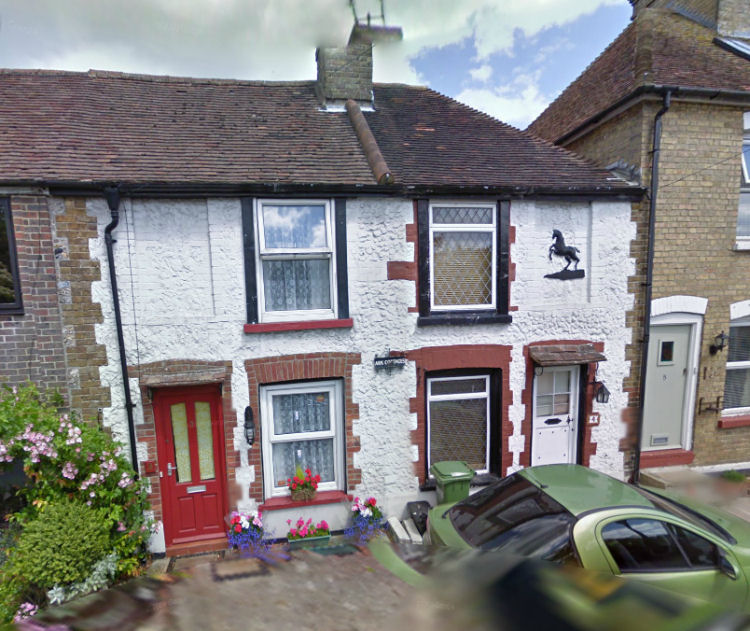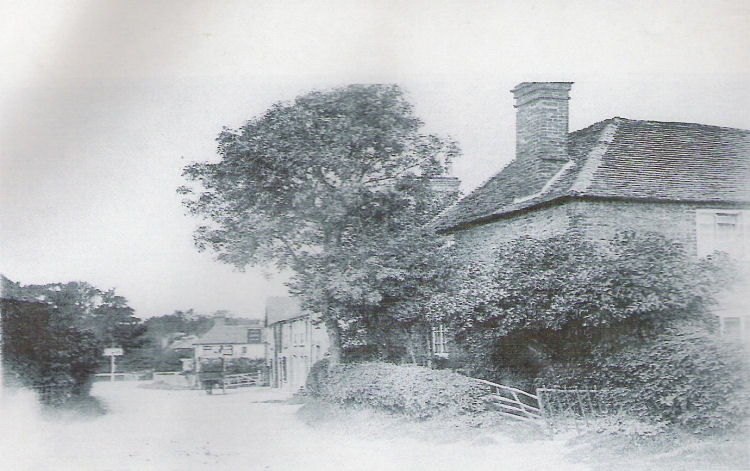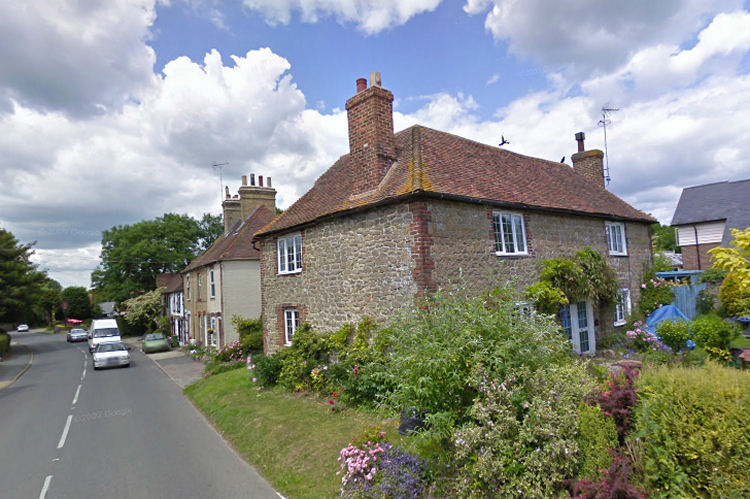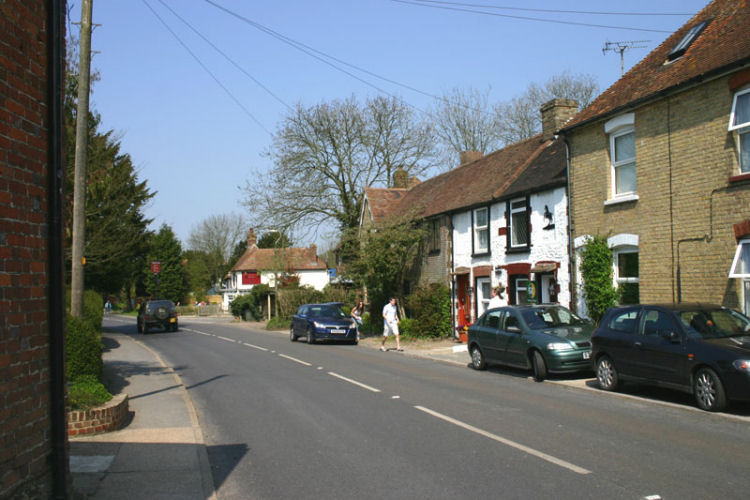|
Court House
Etchinghill

Above showing the Ark Cottages as they were in 2009. |

Date of above photo unknown showing the "New Inn" in the distance and the
"Old Ark Inn" roughly in the centre of the picture.
|

Above photo I believe is almost the same shot, taken from Google Maps June 2009. |

Above photo showing the "New Inn" in the distance and the former premises
of the "Ark Inn" centre right. 2005. Photo taken from web site:-
http://www.oswild.org
|
Just south on the same side of the road as the "New
Inn" are the Ark Cottages. These still retain many of their original
features, but have been modernised and added to since the 16th century when
numbers 1 to 3 were built (1 and 2 now form one dwelling).
The premises was at one time a slaughter house and occupied one or more
of the cottages. The name was probably derived from Noah Dent who kept
a beer house in one of them, unfortunately it closed in 1913. After being
referred to the Compensation Authorities the hearing refused to renew the
licence.
|
NOTES ON ETCHINGHILL AUTHOR UNKNOWN
Kindly sent by local historian Barbara Collins-Newing.
The Ark beer house was probably named after the owner whose first name
was Noah Dent. It was an ale and pie house as well as a slaughter house.
The pub has now been turned into two cottages No.1 and 2 Ark Cottages.
The original wheel for hanging the carcasses on is still in situ in No 1
Ark cottage in the roof of the dining room. I understand that the gully
for taking away the blood and offal is still built into the old tiled
floor beneath the present floor covering.
|
|
Dover Express, Friday 09 February 1906.
LYMINGE. LICENCES OBJECTED TO.
On Monday at the Elham County Police Court, the licensee of the "Ark
Inn," Lyminge, was given notice by the Magistrates that the renewal of
the license would be objected to. The matter will be heard on March 5th,
at the adjourned Licensing Meeting.
|
|
From the Canterbury Journal and Farmers' Gazette, Saturday 6 October, 1906.
THE ARK INN, LYMINGE.
Mr. Hohler, instructed by Mr. Knocker, of Sevenoaks, appeared for the
owner and tenants of the "Ark Inn," Lyminge, while Mr. Wilks, of Hythe,
represented the licensing justices.
P.C. Kenwood stated that the "Ark Inn" was situated at Etchinghill.
There were twenty houses, including farms, there and there was another
fully licensed house, the "New Inn," which was about 70 yards away. The
"New Inn" did most business.
Superintendent Hollands, of Seabrook, stated they were 5 licensed houses
in Lyminge, which was a long straggling village. Two of the houses were
at Etchinghill. He considered that only the "New Inn" was needed, which
was a larger and better house than the "Ark."
Richard Henry Gray, the tenant of the "Ark Inn," stated that before he
took the house he was a Sergeant in the Rifle Brigade. He took part in
the South African campaign and was wounded. Of the 22 houses in the
neighbourhood 19 families dealt at his house. Since he had been at the
house the trade had much increased and he was quite satisfied with the
living he had made.
Thomas Newton, secretary to Messrs. Bushell, Watkins, and Co., stated
that during the past twelve years the house in question had done a
steady trade.
William Richard Hogben, farmer, of Etchinghill, stated that in his
opinion the "Ark Inn" was required because it seemed to do pretty well.
Henry Daniels, carrier, of Lyminge, also stated that he thought the "Ark
Inn" was necessary for the needs of the neighbourhood.
The Committee granted the renewal of this license.
|
|
Re The Licensing (Consolidation) Act,
1910. LYMINGE, KENT.
MESSRS. GEO. MILNE & CO..
HAVE been favoured with instructions to SELL by AUCTION, at the
"Saracens Head," Ashford, on TUESDAY. MAY 12th. 1914, at 3 p.m.. that
Substantially Brick-built FREEHOLD PROPERTY.
Together with the Convenient Outbuildings an Large Garden, known "THE
ARK INN." EACH END HILL. LYMINGE, Near Folkestone, Kent. The property is
to be sold on the account of redundancy and offers an exceptional
opportunity opportunity for conversion into a BUTCHER'S or BAKER’S SHOP.
VILLAGE STORES, or One or Two Cottages, for which there is ample demand
in the district.
Particulars and Conditions of Sale may be had of Messrs. Knocker,
Knocker and Co., Solicitors, Seven Oaks; and of George Milne and Co.,
Auctioneers. 107, Sandgate Road, Folkestone. Tel, 619.
The Magistrates’ Clerk (Mr. Wilks) said the magistrates had decided not
to renew the license of William Spray, of the "Ark Inn," Etching Hill.
The application would stand over until the adjourned meeting. There was
an objection against the house on the ground that it was not required
for the purposes of the district.
The Chairman said there was nothing against the wav the house was
conducted.
The whole of the other licenses were renewed.
PROPERTY SALE.
At their auction sale at the "Saracens Hotel," Ashford, on Tuesday
Messrs. George Milne and Co., of Folkestone sold the leasehold property,
4, Bank-street, Ashford, for £650. The freehold property known as the
"Ark Inn," Lyminge, the license of which had been withdrawn on account
of redundancy, was also offered, and a sale took place immediately after
the auction at £220.
|
|
From the Folkestone Express, Saturday, 22 February, 1913.
ELHAM LICENSING
The adjourned Licensing Session of the Elham County Division were held
on Thursday, when the question of renewing two licences, the “Black
Duck,” Elham, and the “Ark Inn,” Lyminge, came before the Bench, which
was prevailed over by Mr. E. Garnet Man.
The license of the “Black Duck” first came up for consideration.
The question of the renewal of the “Ark Inn,” Lyminge, was then
considered. Mr. Knocker (Sevenoaks) applied on behalf of the owners
(Messrs. Bushell and Watkins) and the tenant (Mr. Wyatt) for the
renewal.
The Clerk said the ground of the objection against the license was that
it was not required for the needs and the wants of the neighbourhood.
P.S. Martin said the house was situate at Eachend Hill, and was within
seventy yards of another house, the “New Inn,” which was larger and
better constructed. The “New Inn” was more convenient for vehicular
traffic, and it had a tea room, smoking room and large bar. He
considered that the licence of the “Ark Inn” was not required for the
needs of the neighbourhood. The Union was quite close to it. The tap
room was merely a passage, and there was a private room behind the bar.
There was a good amount of through traffic as well as local trade in
that district.
In reply to Mr. Knocker, witness said he had not heard any complaints
about the management of the house, which he perfectly well conducted.
The only complaint he had heard against it was that there was not a
living for two houses at the spot. There were five licensed houses in
the district, which he considered was well supplied.
Supt. Hollands said the population of the parish at the last census was
1,367, and as there were five other licensed houses in the district
there was only one licensed house to every 293 of the population. There
were about 26 private houses in the vicinity of the house. The figures
he had quoted as to the population included the inmates at the
workhouse. The “New Inn” was the better house and he considered it was
sufficient to fulfil the requirements of the neighbourhood. The license
had been transferred five times since Jan 18th, 1906.
Cross-examined, the Superintendent said he should not think that a
person could make a living at the “Ark Inn.” The present tenant was
warned before the licence was transferred that it would probably be
referred.
Mr. Knocker said in 1905 the licence was referred to the Compensation
Authority on the ground of redundancy, but they decided not to proceed
with the opposition. In 1906 the Compensation Authority had the licence
before them, and they renewed the licence. They had more confidence in
coming before them that day than in 1906, for then the barrelage sold
was 98½, and during the past three years the average number of barrels
sold was 120. That number of barrels represented 70,000 glasses of beer,
while 4,000 glasses of spirits had been sold. The tenant could see a
gross profit, without counting rent, of something like £230 a year on
the trade he had done on the house. He also carried on a small grocery
business, from which he made a profit of £25. It was a pity that that
notice of opposition was served at the time it was for the owner of the
house were considering whether they should not apply for a new licence
in the village. He therefore, asked the magistrates to renew the licence
for the ensuing year with the intention that their worships would expect
before the next licensing meeting an application for them for the
removal of that licence to a new place in the village.
The Chairman, after the justices had consulted in private, said they
would agree to the matter being adjourned for six weeks, so that Mr.
Knocker could place his proposals before them regarding the application
for a new licence.
|
|
From the Folkestone Herald, Saturday, 22 February, 1913.
ELHAM LICENSING SESSIONS
BLACK DUCK AND ARK INN LICENSES
The adjourned Elham Licensing Sessions were held at Seabrook on
Thursday, the Magistrates being Messrs. E. Garnet Man in the chair, F.
E. Burke, A. S. Jones, R. J. Linton, Councillor H. F. Jacques, Mr. H.
Rigden, and Mr. W. G. Tester.
THE ARK INN, LYMINGE
Mr. Knocker, of Dover, made formal application for the renewal of this
license.
The Deputy Clerk said it was objected to on the grounds that it was not
required.
P.S. Martin said there was about 26 private houses in the vicinity of
the “Ark Inn” at Lyminge. The “New Inn” was about 70 yards away, and was
larger and better constructed. His opinion was that the house was not
required, and that the “Ark” was the least desirable of the two inns.
By Mr. Knocker: There was another house about a mile away. He thought
that the “New Inn” would be sufficient to serve the district of Each End
Hill. There had been no complaints about the “Ark,” but it took trade
from the tramps and such people. He admitted that the house had been
perfectly well conducted. There was not a living for the two houses.
There were five licenses in Lyminge. The whole district there was over
supplied.
Supt. Holland said the population of Lyminge was 1,467; there were five
licensed houses – one to every 293 persons.
By the Bench – The population included the workhouse inmates. The
license had been transferred five times during the past six years. Mr.
Charles Wyatt was now there. It was a tied house, and he would think the
tenant made a very poor living.
Mr. Knocker: Do you think that the tenants hearing that the house had
been referred for the last few years, would get out of the place again
as soon as possible?
Supt, Hollande Well, they were told of that before they took it on.
Mr. Knocker said the “Ark Inn” was referred in 1905 and again in 1906 on
the grounds of redundancy, but the Compensation Authority renewed it.
The population had much increased since then. In 1906 the average
barrelage for three years was 98½, while in 1912 the three years average
barrelage was 120. This meant 70,000 half pint glasses of beer during
the latter three years. The new tenant – a most worthy man would see a
gross profit of £220 according to the increase on the trade since he had
been in the house. There was also a trade in groceries, minerals and
food. The tenant saw an increase continue, so, he had hopes of laying up
for his old age. He was 63.
The Chairman: He will have his old age pension shortly.
Mr. Knocker: Not in this house, your worships; there is far too much
profit. (Laughter). Continuing, he asked the Bench to adjourn the
application so that they might have placed before them plans and
particulars for an ordinary removal of the license from Each End Hill
to Lyminge village, but he asked more particularly that they should
renew the license for one year on the understanding that at the end of
that time it would come before them together with a proposal for a
transference to a fresh site.
The Bench acceded to the request for an adjournment, deciding to hear
the application again in six weeks time.
|
|
From the Folkestone Herald, Saturday, 5 April, 1913.
THE LICENSE REFERRAL
AMUSING EVIDENCE. CUSTOMERS “FOLLOW THE BEER.”
An adjourned sitting of the Elham Licensing Sessions was held at
Seabrook Court on Thursday, the Magistrates being Mr. F. E. Burke (in
the chair), Mr. A. M. Curteis, Mr. A. S. Jones, Mr. R. J. Linton,
Alderman, J. E. Quested, and Mr. W. G. Tester. The court was crowded
with license holders and others.
Mr. Knocker, for the tenant, made a formal application for the renewal
of the license of the “Ark Inn,” Eachend Hill, Lyminge.
Sir Montague Bradley, of Dover, opposed the application on behalf of
certain residents at Lyminge, Mr. R. H. Arrowsmith (of Messrs.
Kingsford, Arrowsmith, and Co., Canterbury) opposed on behalf of the
other license holders in the vicinity of the proposed new site, Mr. E.
W. Mellor opposed on behalf of the Commissioner of Customs and Excise,
Captain W. L. Rossiter, who stated he had the signatures of about 190
residents, opposed on behalf of the Lyminge Parish Council. Mr. Ernest
Smith represented the overseers. Mr. Travis (Secretary of the East Kent
Temperance Federation) was present.
It will be remembered that when the case was before the court six weeks
previous, the application was adjourned in order to allow of the
production of plans, etc., in reference to a proposed new site in
Lyminge village for the “Ark Inn.”
Mr. Chas Wyatt, the tenant, was the first witness. He said he was
satisfied that he could get a good living if the Inn was removed to the
proposed new site.
In reply to Sir Montague Bradley, Mr. Wyatt stated that he had only been
in Lyminge four months. He expected to have more trade if the license
was removed to the new site, Court House, in the village. The new site
was almost 1¼ miles from the present site.
Sir Montague Bradley: And you expect that your present trade would
follow you to the new place, which is 1¼ miles further?
Mr. Wyatt: No, they would not follow me. They would follow the beer.
(Laughter.)
I knew that was the great attraction. Is your trade increasing?
Yes, greatly.
Your personal influence, I suppose?
May be.
Mr. Percy Potter produced the plans of alterations proposed to be made
at Court House if the license of the “Ark Inn” was removed to there. The
various apartments would be much more commodious than those in the
existing “Ark Inn” premises.
Mr. Ernest Edmund Thomas (Ashford), an official of the S.E. and C.
Railway Company, said he had known the Elham Valley district for about
25 years. There were about 10,000 in and out passengers at Lyminge
station per annum. They were largely visitors in the summer months. It
was within his knowledge that there was a number of enquiries at the
station for refreshments, the nearest licensed house to the station at
present was eight minutes' walk. He would say the number of enquiries
for refreshments at the station was twelve a day in the summer, and one
a day, perhaps, in the winter. Court House – the proposed new site of
the “Ark Inn” – was about 130 yards from and faced the station.
Mr. Henry Thomas Smith, Acrise Court Farm, Lyminge, said he had resided
at Lyminge practically all his life. Nothing was more wanted than
another license in the district. His opinion was that where there was
only one licensed house, there was far more intemperance than if there
were two.
In answer to Sir M. Bradley, witness submitted that where he lived was
1½ miles from Court House.
Sir M. Bradley: And you consider that one licensed house means more evil
than two?
Mr. Smith: I do. Put all this lot (indicating the crowded court) into
one house, and what would be the result? (Laughter.)
Mr. Alfred George Parker, Rhodes Farm, Lyminge, said he had known the
district for about 50 years. He “must admit that he was not against the
proposed new house.”
By Sir M. Bradley: Witness lived about 1¼ miles from the spot.
Mr. Robert Mills was of the opinion that Lyminge was fast increasing in
population. The proposed new house was “sure to go.”
Mr. F. E. Newton, Secretary of Messrs. Secretary of Messrs. Bushell,
Watkins, and Smith, the owners of the “Ark Inn,” said the one license at
present in the village proper was surrounded by 150 unlicensed houses,
whereas the two licensed houses at Eachend Hill were in amongst 34
unlicensed houses. At the existing “Ark Inn” the trade during the first
three months of the present year was double that of the trade done in
the first three months of last year, while the average barrelage for the
past three months was 120 per annum.
Mr. Knocker addressed the Magistrates in support of the license being
renewed and pointed out that his clients would prefer having the license
granted for the existing site, but if the Justices were against that,
then he thought they had heard ample evidence in favour of the license
being removed to the village. Temperance, said Mr. Knocker, was an
excellent thing – they all knew that – but the British public would have
their glass of beer when they wanted it, and did not look with favour
upon the prohibition tactics of America.
Sir Montague Bradley, previous to calling upon witnesses for the
opposition, said he was not in that court on behalf of any temperance
society; his was opposition from the citizens, who agreed that the needs
of the place was already supplied by the “Coach and Horses.” He would
like to point out that the application was really one for a new license.
The Rev. A. F. Rutty, Rector of Lyminge, stated that he did not think
another license was needed in the village; he felt it would be very
harmful.
Mr. Knocker: Do you have any need to use a public house?
The Rev. Rutty: Do you mean now, or any time in the past?
Well, I won't unveil the past. (Laughter.) But do you use the “Coach and
Horses?”
I have no occasion to use the “Coach and Horses” as a place of
entertainment.]
Would you suffer if it was closed?
No. But I could get my beer from Mrs. Tritton. (Laughter.)
So you are one of those favoured individuals who get their beer in bulk
and drink it in detail.
Continuing, the witness said he was of the opinion that where there was
a living for only one licensed victualler there was no encouragement of
excessive drinking, but where there were two license holders in
competition there would be that temptation.
Dr. John Wallis said it was not at any time very nice to have a public
house near one's residence.
The Rev. B. Bransom (Wesleyan Minister at Lyminge) said that he felt
there was no necessity for the proposed new license; the locality was
most unsuitable.
In answer to Mr. Knocker, Mr. Bransom said he was a total abstainer, but
through he was of the opinion that the closing of all public houses in
England would be good for the nation, he would not agree to that unless
it was by the express wish of the majority of the people. (Hear, hear.)
The Bench at this point intimated that they would like to retire before
any other witnesses were called. The Chairman, upon their return, said
the Magistrates had decided to refuse the application for a removal of
the license to a new site, and had agreed to refer the existing license
to the compensation authority.
|
|
From the Folkestone Express, 8 November 1913.
CLOSED PUBLIC HOUSES.
At a meeting of the East Kent Licensing Committee, on Tuesday,
compensation was awarded to the owners and tenants of houses in the
district which are to be closed as under:-
The "Ark Inn," Lyminge: tenant, Mr. Charles Wyatt; owners,
Messrs Bushell, Watkins and Co., Westerham. - Total £180;
freeholder, £710; Tenant, £100. |
Peter Moynihan tells me that number 2 Ark Cottages is now (2019) a
micro-bakery Paul – known, unsurprisingly, as the Ark Bakery
LICENSEE LIST
DENT Noah 1845-59 dec'd
DENT Mrs Mary 1859-70 dec'd
BARHAM John 1870-78+ (also baker)
BACK Albert 1882+

MOORE William 1887+
MILLS Edward 1891+

SKINNER Alfred 1895+
SPRAY/GREEN William 1899-1905+ (age 70 in 1901 ) )
 
GRAY Richard Henry 1906+
ADEY John 1907+
TILLEY Mrs Ellen 1909-11+
WYATT Charles 1913
 
1915 the pub was listed as being closed.
https://pubwiki.co.uk/ArkInn.shtml
 From the Post Office Directory 1882 From the Post Office Directory 1882
 From the Post Office Directory 1891 From the Post Office Directory 1891
 From the Post Office Directory 1903 From the Post Office Directory 1903
 From the Kelly's Directory 1903 From the Kelly's Directory 1903
 From the Post Office Directory 1913 From the Post Office Directory 1913
 From the Kelly's Directory 1913 From the Kelly's Directory 1913
|



